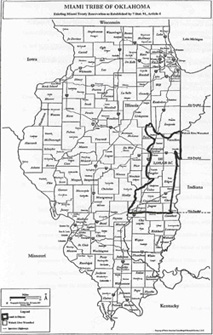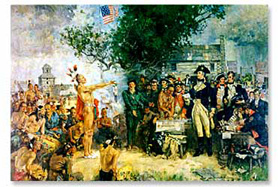|

The History of the Miami Wabash Watershed Tribal Lands
|
|||
| Ten years later (1805), the Treaty of Grouseland (7 Stat. 91) ceded Miami lands farther east in favor of lands in Ohio, Indiana and Illinois. The United States government recognized the exclusive title, ownership, and right to possession of lands located in the Wabash Watershed in parts of what are now Ohio, Indiana, and Illinois by the Miami Tribe and agreed “that no part of the lands guaranteed to the Miami Tribe by treaty could be transferred without the express consent of the Miami Tribe.”
|
|||
Treaties under which Miami ceded lands of the Miami Wabash Watershed Tribal Lands: (exepting 2.6 million acres in east/central Illinois):
|
|
||
|
"The Removal of the Miami Tribe, 1846" by John Fitzgibbon
|
In 1846, the Miami Tribe was
forcibly moved to Miami County, Kansas which split the tribe into
the
Eastern (Indiana) and Western Miamis (Oklahoma). The 148 Indiana Miamis
remaining scattered along the Upper Wabash Valley of Indiana from
Lafayette
to Fort Wayne. Eight years later (1854), the U.S. Senate signed a treaty
recognizing the Indiana Miamis as a nation separate from the Miami
Tribe
of Oklahoma. |
||
Trying to settle a local tax case in 1897, the US Department of Justice declared the Miami Tribes of Oklahoma and Indiana as citizens of the US. Subsequently, the Department of the Interior withdrew federal recognition for the Indiana Miamis as a tribe, effectively terminating the tribe.
|
|||
The
Miami Tribe of Oklahoma sued 25 landowners in Illinois District Court
on June 2, 2000. Almost all
initial coverage of the lawsuit by local media outlets noted the possibility
that the suit was motivated by the Miami Tribe’s desire for land
to use as a casino in Illinois as they had done in Kansas three years
earlier. |
(Photo courtesy of the Champaign-Urbana News Gazette) A 98 year-old landowner from Urbana, Illinois, Rex Walden is the lead defendant in the land claim by the Miami.
|
||
In response, on March 30, 2001, the State of Illinois motioned to dismiss the case for lack of jurisdiction. In their brief, the State “believe[d] that it [wa]s entitled to intervene because resolution of the suit could deprive it of its sovereignty and jurisdiction over the Wabash Watershed Lands, including its power to regulate and tax activities on that land.” The Illinois Attorney General stated, “The Miami Tribe makes much of the fact that it is not coercing Illinois into federal court by seeking money or other property from it, some of the hazards sought to be avoided by the eleventh amendment. However, although the Miami Tribe does not expressly seek in this suit to take money or real estate from Illinois, the suit, by its very nature, seeks to remove at least part of the Wabash Watershed Lands from the area over which Illinois exercises sovereignty and convert it to tribal land. The implications of such a conversion are far greater than those of a mere transfer of ownership between private citizens or even between a private citizen and a tax-exempt organization.” In essence, the State claimed it would loose the revenue from land and income taxes paid by individuals residing on Wabash Treaty Lands. The Miami Tribe of Oklahoma was granted an extension to respond to the State of Illinois’ allegations.
Although dismissed on June 14, 2001 due to the failure by either parties to motion for summary judgement, which expedites the court decision, the Miami Tribe of Oklahoma continues to assert their rights to the Wabash Watershed Tribal Lands.
On May 9, 2002, Illinois State Representative Tim Johnson sponsored a bill that would allow the Miami Tribe to sue the federal government for land claims instead of individual landowners. |
| Media Coverage |
Miami Tribe of Oklahoma v Rex Walden et. al. |
| Miami Casino Development in Indiana and Kansas | |
| The Miami Tribe of Indiana and Federal Recognition |
| |
Department
of Anthropology |
copyright © 2002
University of Illinois, All rights reserved. |




.jpg)